Appalachian Forests
We’re protecting one of the most resilient, diverse and carbon-rich landscapes in the world. But we can't do it alone.
The Appalachians are home to a rich variety of plant and animal species—80,000 occurrences of rare species can be found along the 2,000-mile-long mountain range—as well as diverse communities and cultures. Today, at least 22 million people call the region home, and millions more rely on the clean water and air provided by the expansive forests for their health, livelihoods, and recreation.
However, growing threats from urban development, mining, agriculture, unsustainable forestry, and fragmentation put the region’s public, economic and ecological health at risk. At present, just 26% of this globally important landscape is protected. Climate change further exacerbates these issues. Rising temperatures and extreme weather events are altering and destroying habitats, causing plants and animals to shift their ranges northward and to higher elevations. Nature is on the move and seeking refuge in the Appalachians.

Hemlocks in snow fall at Brook Natural Area in Salt Springs State Park
To combat these threats in Pennsylvania, TNC continues to work with partners on strategic land protection efforts to protect migratory pathways and areas of high biodiversity, particularly along the Kittatinny Ridge at our Hamer Woodlands at Cove Mountain preserve, and along the Allegheny Front. Our conservation strategy in the Appalachians takes a three-pronged approach: protection, restoration and improved management. Science guides our protection efforts to lands that will create climate-resilient corridors.
In places where Appalachian forests have been degraded, we work with partners and volunteers to restore the lands and waters critical to people and nature. At our dozens of nature preserves and other land holdings across the Appalachians, TNC implements best management practices that improve ecological conditions and serve as demonstration sites for our public and private landowner partners whom we want to see adopt similar practices.
Kittatinny Ridge
_1640x1230.jpg?crop=0%2C0%2C4000%2C2500&wid=640&hei=400&scl=6.25)
The Kittatinny Ridge is part of an unbroken chain of forested mountains forming a vital link in the 1,500-mile-long Appalachian Mountain Range—a mosaic of rugged topography and varied elevation that makes it one of the most diverse habitats on Earth.
Identified as the most resilient landscape in the state for adapting to climate change, this forested corridor provides an incredibly biodiverse superhighway that allows wildlife to move safely within and between climate-resilient neighborhoods to escape rising temperatures, increased floods, or drought. Scientists have identified it as critical to the future of hundreds of animal and bird species amid a changing climate.
To safeguard the Kittatinny’s mostly intact wildlife superhighway, TNC is working with landowners and partners to protect these critical, connected lands on and next to the ridge.
Hamer Woodlands at Cove Mountain

The Hamer Woodlands at Cove Mountain is located in Perry County, a region of Pennsylvania where land protection plays a critical role in local economies that depend on outdoor recreation.
This 1,379-acre preserve is a globally recognized southwest-to-northeast migratory corridor for species movement and helps fill a gap between existing conservation lands, creating a 14-mile stretch of protected land along the Kittatinny Ridge.
Since acquiring this property, The Nature Conservancy has developed a forestry management plan to improve the ecological conditions of the land to help ensure this chain of forests is one of the most important landscapes for climate adaptation in Pennsylvania.
The Hamer Woodlands at Cove Mountain
Dive deeper and learn more about how our work at Cove Mountain creates a more connected, healthy, and climate-resilient Appalachians for the future.

Working Woodlands
.jpg?crop=0%2C0%2C3008%2C1880&wid=640&hei=400&scl=4.7)
TNC's Working Woodlands program helps landowners ensure that their forests remain healthy, productive and profitable for future generations.
Landowners who enroll their forest in TNC's Working Woodlands program enter into a forest management plan that focuses on creating a diverse, native ecosystem that is capable of withstanding current and future forest threats that are exacerbated by a changing climate.
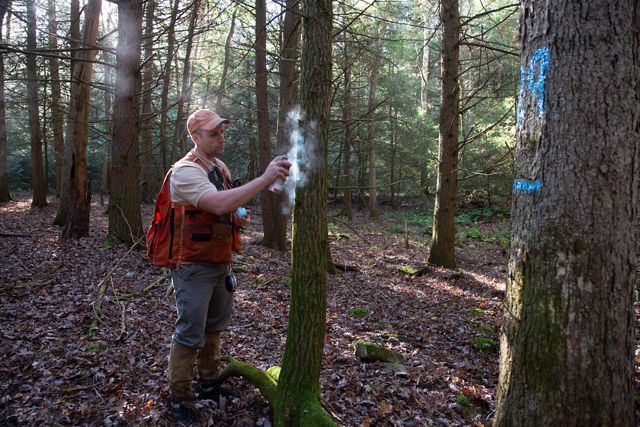
Once a forest management plan is in place, the forest can provide a stable and predictable source of income for the landowner through sustainable timber harvesting and carbon credit sales tied to the additional carbon that will be stored by the forest.
As the Working Woodlands easement holder, TNC receives a percentage of the income generated by the forest, which goes entirely back into work that advances the protection, management and restoration of PA's forests. Businesses that participate in the Working Woodlands program through the purchase of carbon offset credits are only eligible to participate if they are also working to reduce their own carbon emissions resulting from business operations.
In a landscape like Pennsylvania, where the forests we enjoy today were clear-cut within the last 150 years, the value of longterm and permanent land protection that comes along with a Working Woodlands easement will keep our forests healthy for future generations to enjoy.

Science guided the creation of TNC’s Resilient and Connected Network goals across the Appalachians. This map shows our priority landscapes in Pennsylvania, where we’re focusing our land protection efforts, Working Woodlands projects, and Family Forest Carbon Program enrollment.
Quote: Kevin Yoder
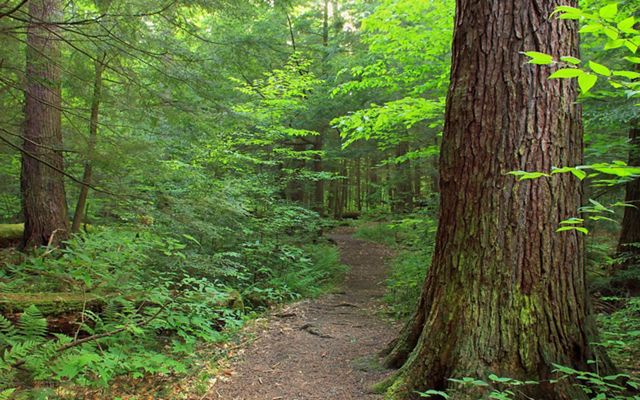
Working Woodlands is based on a simple principle. Landowners agree to keep enrolled acres in a healthy forested state. In return, they benefit from assistance with improving the value and the diversity of their forest.

Woodlands at Work in Central PA
Over the years, the Borough of Duncannon, located just outside Harrisburg, regularly harvested timber on a 1,620-acre forested property to generate money for the community. The property also boasts popular local hikes, like the Hawk Rock Overlook on the Appalachian Trail. Over time, invasive and exotic species like striped maple, mile-a-minute vine and the tree of heaven took over the native trees, leaving the forest compromised and lacking its former vitality.
Enter TNC. We worked with the Borough to enroll the property in the Working Woodlands program, with the aim of transforming it into a more diverse, resilient native forest ecosystem capable of standing up to current—and future—forest threats exacerbated by a changing climate. With a forest management plan in place, the forest will once again generate timber revenue.
Pennsylvania Guidelines: Enrolling in the Working Woodland Program
The Working Woodlands program requires a minimum of 2,000 forested acres in Pennsylvania. To learn more about enrolling your property in Working Woodlands, click here, or contact:
Barry Ulrich, Director
Working Woodlands Program
barry.ulrich@TNC.ORG
703-200-9361
The Family Forest Carbon Program
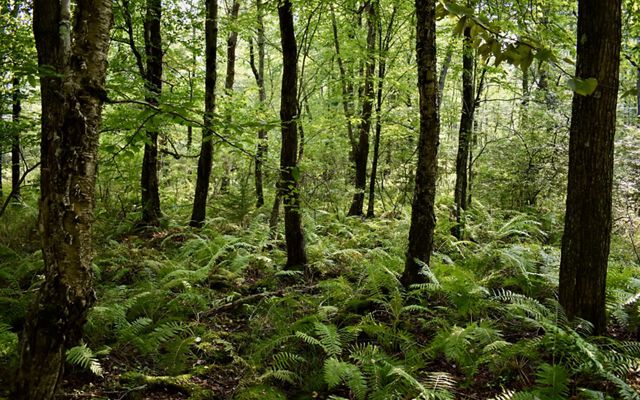
The Family Forest Carbon Program (FFCP) is a partnership of the American Forest Foundation (AFF) and The Nature Conservancy (TNC), working with leading state and federal agencies, businesses and America’s 21 million family forest owners to mitigate climate change on a global scale.

Family forest owners, who own 39% of forests in the United States, are a critical piece of the puzzle when it comes to maintaining and improving carbon sequestration. Despite their valuable experience, many family forest owners are currently locked out of carbon markets and are often unable to realize the true potential of their land. Many family forest owners struggle with technical expertise and high costs when it comes to optimizing their land for carbon sequestration.
The FFCP incentivizes specific forest management practices which have been scientifically demonstrated to enhance carbon sequestration, improve forest health and provide other important ecosystem benefits. The implementation of these practices across a known acreage will result in sequestration reportable in tons.
How it Works
The FFCP is designed to remove one of the most significant barriers for family forest owners to sustainably manage their forests: the high cost of forest of management activities. The program also provides technical assistance and professional guidance to landowners on the best options for their forests. Learn why the DeSeve family decided to enroll their 100-acre forested parcel in the Poconos in the Family Forest Carbon Program by clicking here.
It also removes one of the most significant barriers that keeps family forest owners from accessing existing carbon markets by lowering traditionally high transaction costs. Because the FFCP monitors practices instead of calculating carbon on each forest parcel, which is resource-intensive to continually inventory and monitor, we reduce the transaction costs to landowners by at least 75%.

By opening up new markets for family forest owners who own 30 to 2,400 acres of forestland, greater numbers of these landowners can participate and create income, all while making a significant contribution to the nation’s climate mitigation strategy. This new model of climate finance is an innovative way to provide rural landowners with the funding required to sustainably manage their forests.
The program will produce valid and scientifically defensible carbon claims at a landscape scale, while also delivering many environmental co-benefits, like wildlife habitat and water quality. We will verify our results through a random sampling of properties that will receive full, on-the-ground monitoring, which will improve the modeling over time.
How to Get Involved
The Family Forest Carbon Program offers a unique opportunity for family forest owners to do what is best for their land while getting paid for it. By bringing more landowners into the market for carbon, foresters and local partners have a new path to reach their goals for private forest management, conservation outcomes and improving the health and resiliency of landscapes in their regions. Together, we can have a significant impact on local economies, ecosystems and global climate mitigation efforts.
For information on how to check your property’s eligibility, please check here.
Download
Learn how the Appalachians provide opportunities to tackle the intertwined climate & biodiversity crises while benefiting local communities.
DOWNLOAD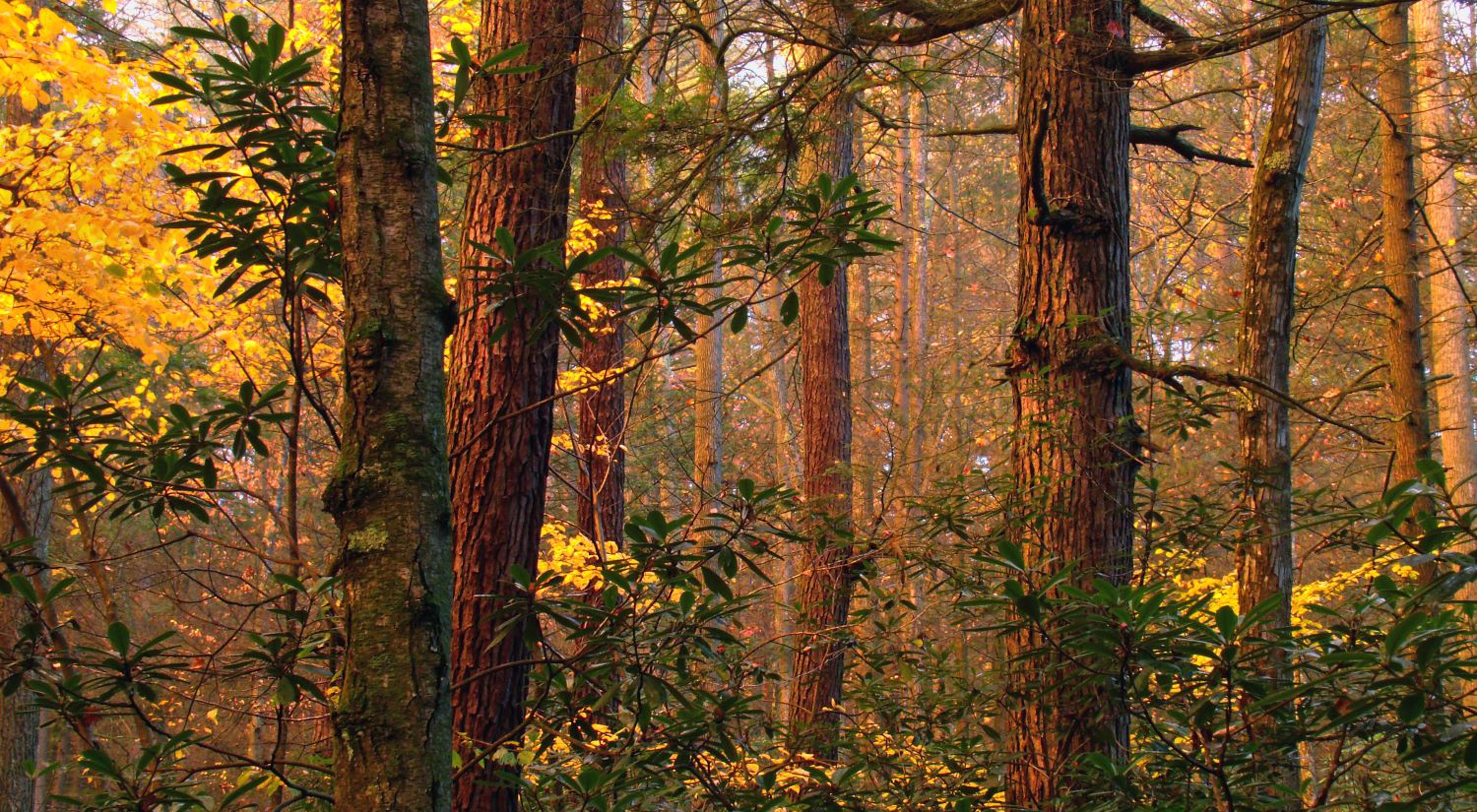


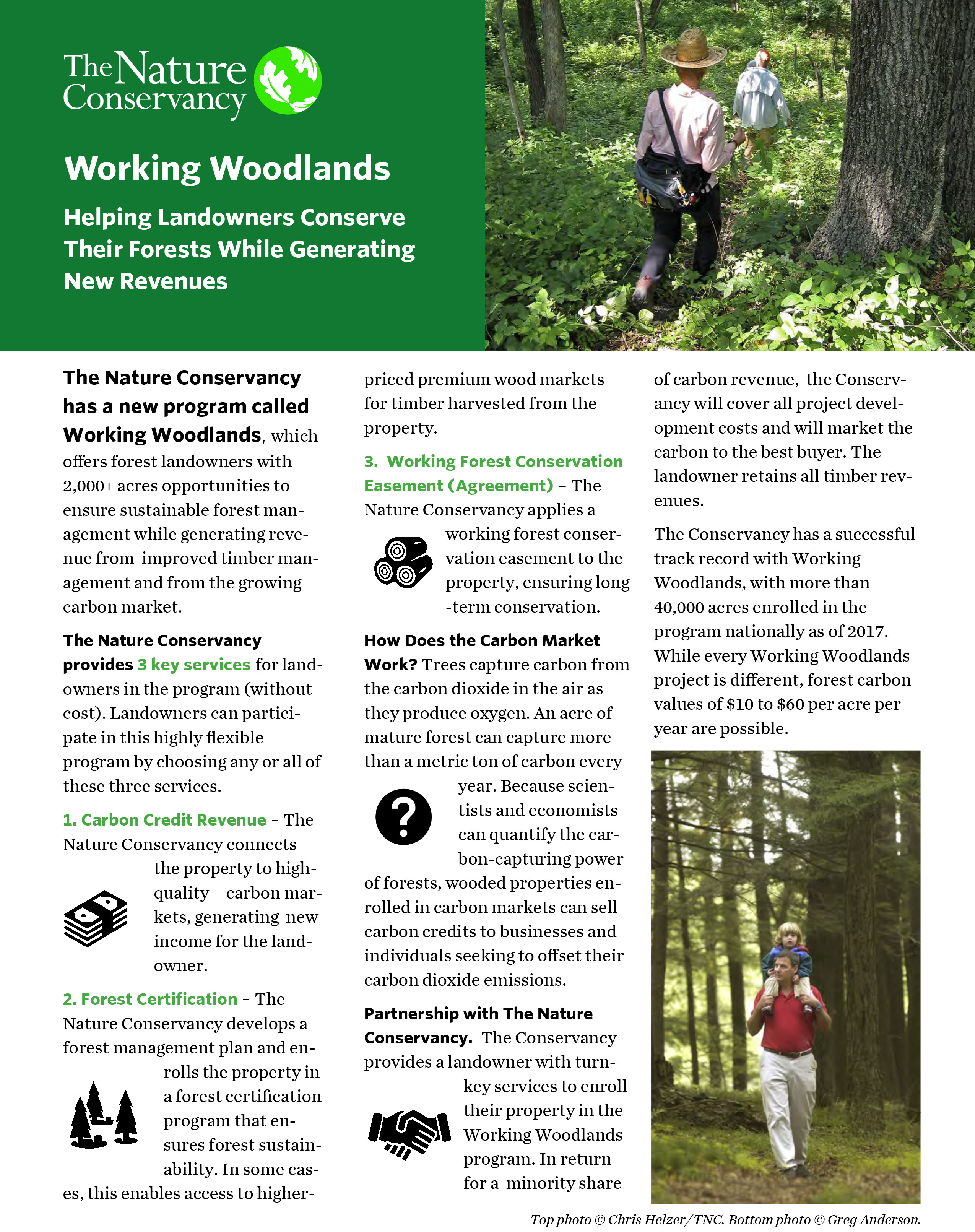

_1640x1230.jpg?crop=208%2C0%2C3584%2C2688&wid=300&hei=225&scl=11.946666666666667)

